From December 6 to 10, 2021 the Greek school that coordinates this project hosted the 1st transnational mobility for the peer-teaching of Modern Greek.
To prepare for this Learning, Teaching and Training Activity, the Greek project team was divided in four sub-groups:
- the peer-teachers who were actively engaged in interacting with their peers from the five partner schools and teach them Modern Greek in an experiential way according to Suggestopedia, an innovative approach to experiential accelerative learning which orchestrates linguistic and artistic stimuli and accommodates them within a scenario of real-life communication in the foreign language. This approach is ideal for short peer-teaching language courses that use culture as the vehicle for language teaching. You can read more about it in the PAGES of this TwinSpace.
They were explained its philosophy and trained in the methodology in 20 hours while peer-teaching the same Modern Greek course to a group of newly arrived migrants.
- the assistant peer-teachers who produced the teaching materials and resources for the peer-teachers to use. They contributed to the creation of the suggestopedic textbook by including the cultural aspects that were voted for as the most interesting ones in this project's parallel eTwinning project "CULTURE MIRRORS" (the videos on Greek culture are available in the PAGES of the TwinSpace CULTURE MIRRORS at https://twinspace.etwinning.net/111684/pages/page/950594 ). The assistant teachers were also responsible for observing the lessons for evaluation and further training.
- the technical support team who were in charge of the electronic equipment, the set up of the room, the digital resources, the video recording of the lessons and the timing.
- the guides who were responsible for the familiarisation of the guests with the school facilities, the hosting families and for the safety and orientation of all foreign students in town in their free time.
The lessons followed the suggestopedic cycle of four stages: Introduction, Session, Elaboration and Production. During the introduction, the peer teachers engaged the learners in conversation presenting them with the ways in which they can perform simple everyday communication tasks in Modern Greek: greetings, talking about likes and dislikes, languages and nationalities, introducing themselves and their families, talking about their interests, hobbies, talents and aspirations. To do so more naturally and meaningfully, the peer teachers encouraged the learners to choose new identities of young adults travelling the world and preparing for a performance at the most famous Greek theatres.
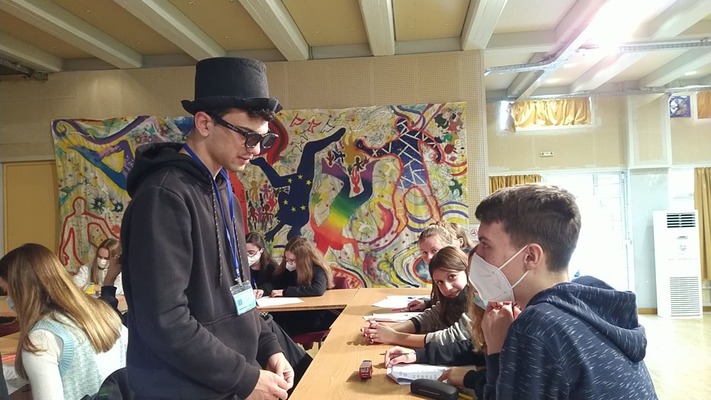
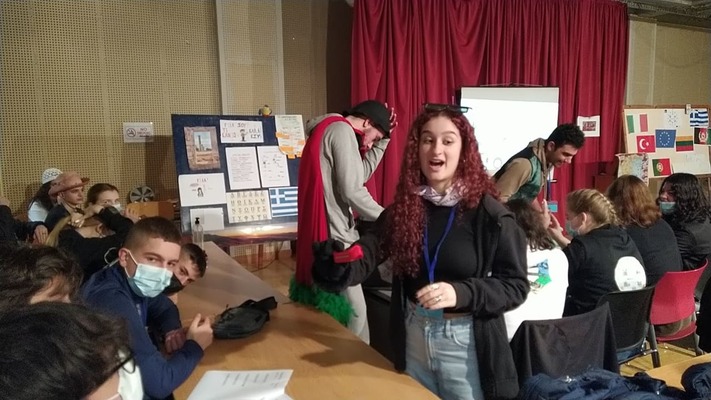
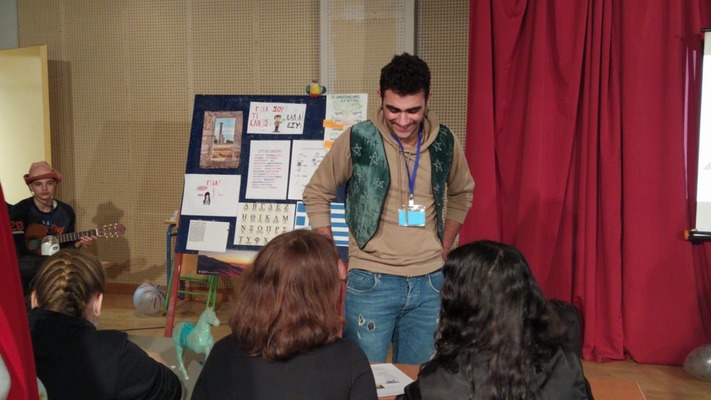
The second stage, the session, was quite different. The peer teachers handed out the suggestopedic textbook that is written in the form of a libretto for the opera and encouraged the learners to read aloud after them to the background of classical music. This stage of the cycle facilitates the cognitive processing of the linguistic input on a subconscious level since the attention of the learners is drawn away from the learning process and onto the classical performance.
During the elaboration, the learners read from the libretto again but without classical music in a communicative way, practicing the language with games and didactic songs and dances.
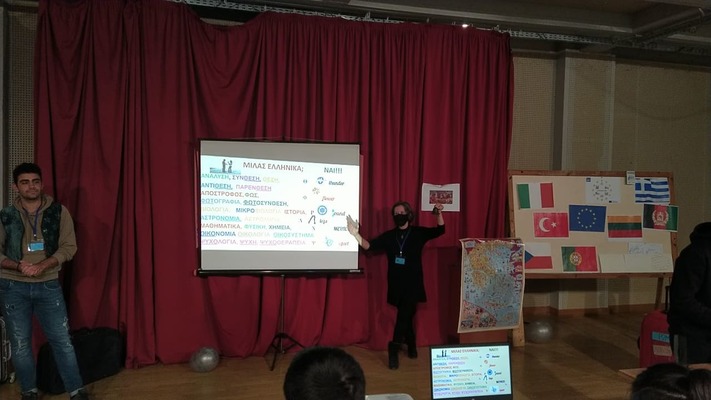
The last stage, the production, involved using the language structures and lexis from the libretto in order to role play a casting interview.
Beyond the Greek language peer teaching we visited some of the cultural and archeological sites that feature in our syllabus. Five Greek students guided their peers from the partner school at the New Acropolis museum and the archeological site in Delphi with interactive games and experiential activities inspired by history and culture. A poem contest started at the theatre in Delphi and was continued at school.
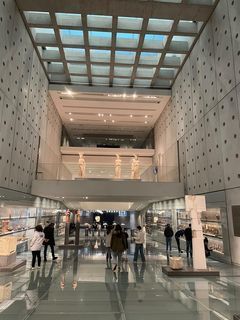
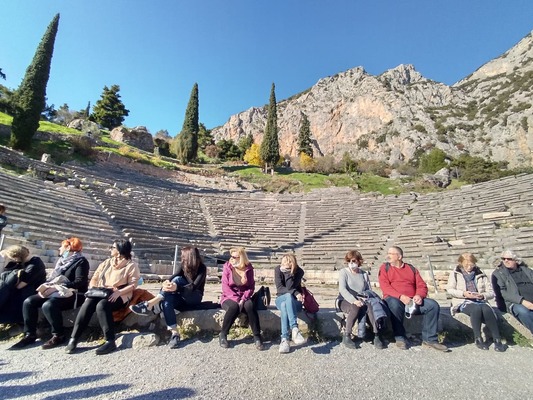
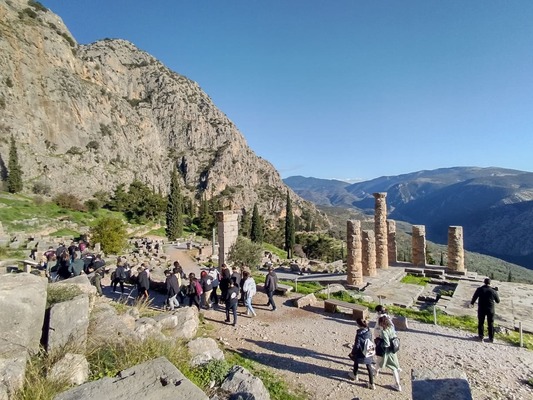
We also visited the Museum of Ancient Music, Inventions and Technology where we had hands-on experience of ancient musical instruments, played ancient board games and discovered the origins of most of today's technology.
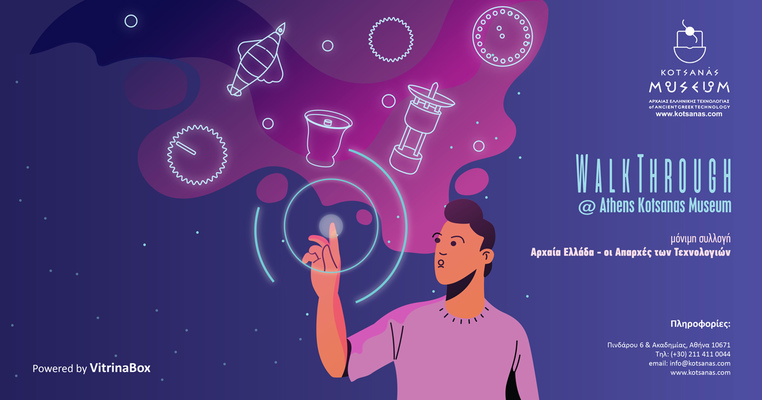
Of course, we experienced as much of the Greek culture as possible!
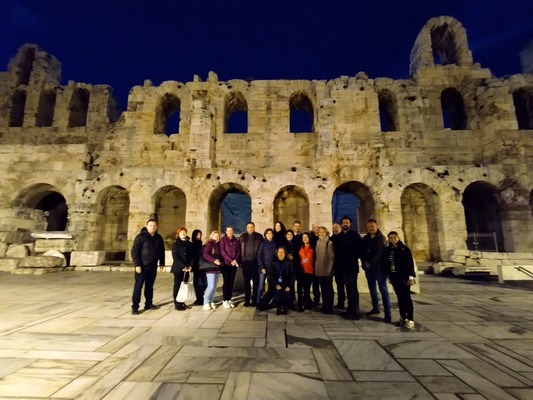
Last, but not least, the meeting included several social activities: a school party at which all teams danced together to their traditional and typical music, a song contest from across our cultures and a traditional dance performance by the Greek school dance team.
Here is our programme for the whole week:
Timetable.pdf